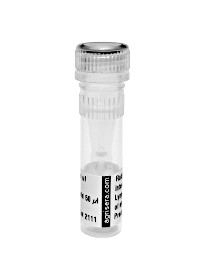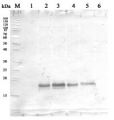1

Anti-GPX | Glutathione peroxidase (chloroplastic)
AS04 055 | Clonality: Polyclonal | Host: Rabbit | Reactivity: Arabidopsis thaliana
- Product Info
-
Immunogen: thioredoxin fusion of 58 amino acid region between Ser at position 175 and the C-terminal Ala of Arabidopsis thaliana GPX7 accession At4g31870 has been used for antibody production
Host: Rabbit Clonality: Polyclonal Purity: Serum Format: Lyophilized Quantity: 100 µl Reconstitution: For reconstitution add 100 µl of sterile water Storage: Store lyophilized/reconstituted at -20°C; once reconstituted make aliquots to avoid repeated freeze-thaw cycles. Please remember to spin the tubes briefly prior to opening them to avoid any losses that might occur from material adhering to the cap or sides of the tube. Tested applications: ELISA (ELISA), Western blot (WB) Recommended dilution: 1 : 1, 1 : 2, 1 :4, 1 :8, 1 : 16 (ELISA), 1 : 5000 (WB) Expected | apparent MW: 25 | 20 kDa
- Reactivity
-
Confirmed reactivity: Arabidopsis thaliana Not reactive in: No confirmed exceptions from predicted reactivity are currently known - Additional Information
-
Additional information (application): This antibody is recognizing Arabidopsis thaliana GPX (two chloroplastic isoforms). Antibody has also a weak cross-reactivity to cytosolic forms, therefore work on isolated chloroplasts is recommended.
- Background
-
Background: GPX belongs to the group of enzymes that protect cells against oxidative damage generated by reactive oxygen species (ROS). Glutathione peroxidase catalyzes the reduction of H2O2, organic hydroperoxides, and lipid peroxides in the presence of glutathione, the hydrogen donor. Activity of the enzyme can be increased under environmental stress. Immunogen: Peptide target chosen from C-terminal of two chloroplastic isoforms of Arabidopsis thaliana GPX.
- Product Citations
-
Selected references: Lepistö et al. (2013). Deletion of chloroplast NADPH-dependent thioredoxin reductase results in inability to regulate starch synthesis and causes stunted growth under short-day photoperiods. J Exp Bot. July 23.
Juszczak et al. (2012). Natural genetic variation in the expression regulation of the chloroplast antioxidant system among Arabidopsis thaliana accessions. Physiol. Plant.
- Protocols
-
Agrisera Western Blot protocol and video tutorials
Protocols to work with plant and algal protein extracts - Reviews:
-
Alicja Buczynska | 2014-05-08I used this antybody for GPX immunodetection analysis in the leaves of three grasses: Echinochloa crus-galli, Digitaria sanguinalis and Zea mays plants (all NADP-ME subtype). For each treatment 15 µg of total proteins extract from the leaves were loaded on SDS-PAGE (12% acrylamide) and immunodetected with anti-GPX (Agrisera). The highest signal was observed in Echinochloa crus-galli, Digitaria sanguinalis, and the weakest signal was noted in Zea mays in different light intensities.



